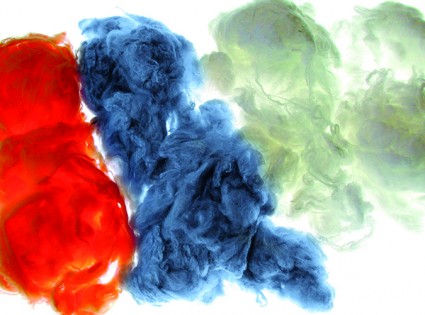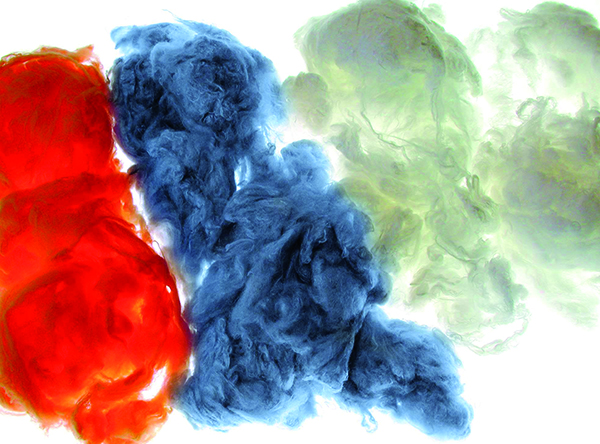Lenzing is launching a new TENCEL® fiber made from cotton waste fabrics to drive ‘circular economy’ solutions in the textile industry.
The new generation of lyocell fibers will be the most ecological wood-based fiber on the planet – combining cotton waste recycling with Lenzing’s pioneering closed-loop TENCEL® production on a commercial scale. Lenzing is pushing new frontiers in ecological innovation and circular economy.
 Lenzing achieved another milestone in its innovation heritage in the textile industry by developing a TENCEL® fiber based on cotton fabric waste. Lenzing is the first manufacturer worldwide to offer such cellulose fibers incorporating recycled materials on a commercial scale. TENCEL®, already a market success as an eco-friendly fiber, is now achieving another key milestone by creating from natural resources what is likely the most sustainable fiber. TENCEL® from cotton waste fabrics will further build Lenzing’s reputation as a leader in the field of environmental technology and will push new solutions in the textile industry towards circular economy by recycling waste. “For Lenzing, developing circular business models in the fashion industry ensures the decoupling of business growth from pressure on ecological resource consumption. It reduces the need to extract additional virgin resources from nature, and reduces the net impact on ecological resources,” says Robert van de Kerkhof, CCO of Lenzing.
Lenzing achieved another milestone in its innovation heritage in the textile industry by developing a TENCEL® fiber based on cotton fabric waste. Lenzing is the first manufacturer worldwide to offer such cellulose fibers incorporating recycled materials on a commercial scale. TENCEL®, already a market success as an eco-friendly fiber, is now achieving another key milestone by creating from natural resources what is likely the most sustainable fiber. TENCEL® from cotton waste fabrics will further build Lenzing’s reputation as a leader in the field of environmental technology and will push new solutions in the textile industry towards circular economy by recycling waste. “For Lenzing, developing circular business models in the fashion industry ensures the decoupling of business growth from pressure on ecological resource consumption. It reduces the need to extract additional virgin resources from nature, and reduces the net impact on ecological resources,” says Robert van de Kerkhof, CCO of Lenzing.
TENCEL®, the most ecological fiber from nature, now featuring circular economy
TENCEL® has already been awarded the EU award for the most eco-friendly production process based on 99.7% closed loop circulation in the production and use of bio-energy. The renewable raw material of wood from sustainable forestry is another key advantage in terms of sustainability for TENCEL®. The latest next-generation TENCEL® fiber combines the best of two worlds – recycling cotton waste fabrics and using the most sustainable TENCEL® technology – to create one of the most ecological wood-based fibers on the planet. The recycling of cotton waste fabrics into virgin textile TENCEL® fibers offers a practical solution to enable circular economy in the apparel industry.
New approaches to marketing
The new TENCEL® fiber introduces an innovative approach to marketing. The fiber is not sold directly to yarn or fabric manufacturers. It will be exclusively offered to leading retailers and brands that in turn could produce their garment collections in the most sustainable way by engaging the right value chain partners. This ensures close co-operation and transparency in the entire textile value chain.
 A new type of identification procedure is employed to guarantee transparency for the TENCEL® fiber. This allows Lenzing to assure retailers that the TENCEL® fibers in the garment are indeed the most eco-friendly wood-based fibers.
A new type of identification procedure is employed to guarantee transparency for the TENCEL® fiber. This allows Lenzing to assure retailers that the TENCEL® fibers in the garment are indeed the most eco-friendly wood-based fibers.
At the current time, the fiber is being tested with selected brand manufacturers and retailers and is at the point of being introduced to the market. “Close cooperation with the sustainability leaders in the retail business gives us the chance to find common solutions to overcome sustainability related challenges in the fashion industry and effectively implement circular economy concepts,” van de Kerkhof explains. “The next generation TENCEL® fiber is revolutionizing the fiber industry and has the potential to significantly change consumers’ behavior,” van de Kerkhof continues.
#TENCEL #fiber #Lenzing #cotton #fabrics #textile #industry #innovation #business #nature #marketing







